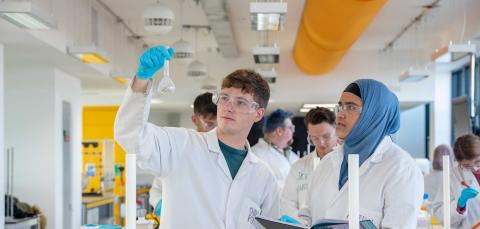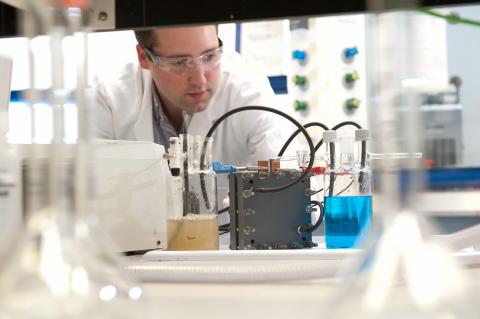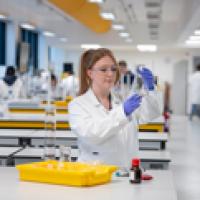About this course
Master the skills required for the new generation of chemical industries. You’ll learn how to use computational modelling, artificial intelligence and the analysis of big data to solve complex chemistry problems.
The chemical industries of today are being revolutionised by big data, automation and machine learning.
This one-year MSc programme will position you at the forefront of these developments, giving you the skills required to succeed within a rapidly evolving sector.
You’ll explore topics like:
- the theory and application of data science
- computational modelling techniques
- AI and machine learning approaches to modern chemical problems
You’ll also develop skills in:
- programming in python
- software development
- analysing large and complex data sets
You'll work with academic staff who are at the cutting edge of research in computational chemistry.
This programme includes hands-on experience in modern facilities, which may include the University’s supercomputer Iridis 5, which can perform over a quadrillion calculations per second.
Working with state of the art computational software and hardware is central to this programme, giving you the ability to demonstrate a comprehensive understanding of modern approaches applicable to your own research or advanced scholarship.
We regularly review our courses to ensure and improve quality. This course may be revised as a result of this. Any revision will be balanced against the requirement that the student should receive the educational service expected. Find out why, when, and how we might make changes.
Our courses are regulated in England by the Office for Students (OfS).
Learn more about this subject area
Course location
This course is based at Highfield.
Awarding body
This qualification is awarded by the University of Southampton.
Download the Course Description Document
The Course Description Document details your course overview, your course structure and how your course is taught and assessed.
Entry requirements
2:1 degree or equivalent in Chemistry, Chemistry with Software Engineering/Computer Science, Physics Materials Science or Chemical Engineering. Students with a Mathematics background will also be considered.
Find the equivalent international qualifications for your country.
English language requirements
If English isn't your first language, you'll need to complete an International English Language Testing System (IELTS) to demonstrate your competence in English. You'll need all of the following scores as a minimum:
IELTS score requirements
- overall score
- 6.5
- reading
- 6.0
- writing
- 6.0
- speaking
- 6.0
- listening
- 6.0
We accept other English language tests. Find out which English language tests we accept.
Pre-masters
If you don’t meet the English language requirements, you can achieve the level you need by completing a pre-sessional English programme before you start your course.
If you don’t meet the academic requirements, you can complete a pre-master's programme through our partnership with ONCAMPUS. Learn more about the programmes available.
Got a question?
Please contact us if you're not sure you have the right experience or qualifications to get onto this course.
Email: enquiries@southampton.ac.uk
Tel: +44(0)23 8059 5000
Course structure
This is a one-year course, made up of three semesters. The taught part of the programme takes place within semesters one and two, with the research component taking place in semester three.
Each semester includes twelve weeks of study followed by two or three weeks of examinations.
You’ll complete a range of compulsory modules on the fundamentals of digital chemistry, whilst also having the opportunity to specialise further through a range of optional choices.
Optional modules will enable you to tailor your degree to your interests, whether it’s exploring topics like sustainable chemistry or nuclear magnetic resonance (depending on the prerequisites).
Want more detail? See all the modules in the course.
Modules
The modules outlined provide examples of what you can expect to learn on this degree course based on recent academic teaching. As a research-led University, we undertake a continuous review of our course to ensure quality enhancement and to manage our resources. The precise modules available to you in future years may vary depending on staff availability and research interests, new topics of study, timetabling and student demand. Find out why, when and how we might make changes.
Year 1 modules
You must study the following modules :
Artificial Intelligence and Machine Learning in Chemistry
The aim of the module is to expose the students to modern chemical informatics, machine learning (ML) and artificial intelligence (AI) driven approaches for computational modelling and prediction, illustrated with applications to research in to the discov...
Chemistry MSc Advanced Research Project
The project involves approximately 600 hours of commitment including 14 weeks of full-time practical-based research work (ca. 450 hours). It commences with literature research and project planning, some of which has been performed in other modules previou...
Chemistry through the Computational Microscope
This module builds on the student’s core understanding of the structure of atoms and molecules to predict their behaviour using state-of-the art computational chemistry methods. This will involve learning how quantum chemistry methods can be used to st...
Data Management, Numerical Methods and Analysis
Having learned in semester one how to develop and optimise code to generate new and interesting data, you will now learn how to handle the resulting data and maximise the information retrieved. This module provides training in advanced numerical methods ...
Programming in Python and Software Development
This module will introduce the basics required to produce efficient and effective code. You will be introduced to the underpinning architecture of a modern computer and from this starting point learn the basic of good computer practice from a code agnosti...
Scientific writing and presentation skills for Chemistry MSc
This module involves the completion of a literature review in preparation for the student’s MSc dissertation project. The results of the literature review are presented in a written report and in a short oral presentation. To support the preparation of th...
You must also choose from the following modules :
Advanced Chemical Biology
Advanced NMR Spectroscopy and MRI
This module provides advanced Magnetic Resonance spectroscopy and imaging background to students who would like to work professionally in quantum technologies based on spin.
Advanced Spectroscopy and Applications
Modern spectroscopic techniques underpin a wide range of chemical and biological research as well as serving as a valuable analytical tool. This module will introduce some of the key principles, tools and techniques that govern spectroscopic measurements ...
Inorganic Materials Chemistry
Magnetic Resonance
This module aims to develop an understanding of spin and magnetic resonance techniques at an introductory level. It is intended to prepare the students with fundamental and basic knowledge about the magnetic resonance spectrometer, data processing, the co...
Supramolecular Chemistry of Functional Molecules and Materials
This module will explore the fundamental basis of intermolecular interactions and illustrate how these can be exploited to form diverse supramolecular assemblies ranging from small molecules, soft gels and hard extended inorganic solids. The course will p...
Sustainable Chemistry
Learning and assessment
Learning
Your overall workload consists of class contact hours, independent learning, and assessment activity, with each CATS credit taken equivalent to 10 hours of student effort.
While your actual contact hours may depend on the option modules you select, the information available on our webpages give an indication of how much time you will need to allocate to different activities.
When not attending lectures, seminars and other timetabled sessions you will be expected to continue learning independently through self-study.
Typically, this will involve:
- reading journal articles and books
- working on individual and group projects
- undertaking research in the library
- preparing coursework assignments and presentations, and for other types assessments and examinations
Full information about contact hours is provided in individual module information.
Assessment
Your course provides you with opportunities to test your understanding of the subject informally before you complete the formal assessments that count towards your module mark.
Each module normally contains at least one piece of practice or formative assessment for which you receive feedback. Formative assessments are developmental, and any results do not count towards your module mark, but they are an important part of your learning.
Summative assessments usually take place at the end of each module, although some may have interim assessments throughout.
Assessment methods might include written examinations and a range of coursework assessments such as essays, reports, portfolios, performance, presentations and projects for example. The marks from summative assessments count towards your module mark.
The information available on our website gives an indication of the assessment methods used on your course.
Academic Support
You will be taught by an experienced teaching team whose expertise and knowledge are closely matched to the content of the modules on your course. The team includes senior academics, professional practitioners with industry experience, demonstrators and technical officers.
Postgraduate research students who have undertaken appropriate training may also contribute to the teaching of seminars if their research specialism is directly related to the topic of the module and may also be involved in practical classes, project work and field trips.
All contributions will be carried out under the supervision of the module leader.
One of the most important people you will meet while you are a student at Southampton is your Personal Academic Tutor, who will be allocated to you for your arrival at the University and who is normally a member of academic staff in your own or a closely related subject area.
Your Personal Academic Tutor will offer one-to-one support and advice throughout your time at Southampton and will support you in your studies or with other issues you may have.
Careers
With a strong foundation in chemistry, and skills in computing, you’ll have a broad range of profitable careers to choose from.
This includes careers in industries like:
- chemical and pharmaceutical
- data science
- analytics and informatics
- chemical research
- finance and banking
- software development
- teaching
- consultancy
Find out more about careers in chemistry.
Careers services at Southampton
We're a top 20 UK university for employability (QS Graduate Employability Rankings 2022). Our Careers, Employability and Student Enterprise team will support you throughout your time as a student and for up to 5 years after graduation. This support includes:
- work experience schemes
- CV/resume and interview skills workshops
- networking events
- careers fairs attended by top employers
- a wealth of volunteering opportunities
- study abroad and summer school opportunities
We have a thriving entrepreneurship culture. You'll be able to take advantage of:
- our dedicated start-up incubator, Futureworlds
- a wide variety of enterprise events run throughout the year
- our partnership in the world’s number 1 business incubator, SETsquared
Fees, costs and funding
Tuition fees
Fees for a year's study:
- UK students pay £9,250.
- EU and international students pay £30,000.
Deposit
If you're an international student on a full-time course, we'll ask you to pay £2,000 of your tuition fees in advance, as a deposit.
Your offer letter will tell you when this should be paid and provide full terms and conditions.
Find out about exemptions, refunds and how to pay your deposit on our tuition fees for overseas students page.
What your fees pay for
Your tuition fee covers the full cost of tuition and any exams.
Find out how to pay your tuition fees.
Accommodation and living costs, such as travel and food, are not included in your tuition fees. Explore:
10% alumni discount
If you’re a graduate of the University of Southampton, you could be eligible for a 10% discount on your postgraduate tuition fees.
Southampton Chemistry Postgraduate International Scholarship
A scholarship of £3,000 is available to international students studying for a postgraduate master’s in Chemistry.
Find out more about the Southampton Chemistry Postgraduate International Scholarship, including eligibility and conditions.
Southampton Chemistry Deans International Scholarship
Four scholarships offer international students £5,000 off their first year of study of chemistry and chemical engineering at either undergraduate or postgraduate level.
Find out more about the Southampton Chemistry Deans International Scholarship, including eligibility, deadlines and how to apply.
Other postgraduate funding options
A variety of additional funding options may be available to help you pay for your master’s study. Both from the University and other organisations.
Funding for EU and international students
Find out about funding you could get as an international student.
How to apply
- Use the 'apply for this course' button on this page to take you to our online application form.
- Search for the course you want to apply for.
- Complete the application form and upload any supporting documents.
- Submit your application.
For further details, read our step by step guide to postgraduate taught applications.
Application deadlines
UK students
The deadline to apply for this course is Wednesday 3 July 2024 - midday UK time.
We advise applying early as applications may close before the expected deadline if places are filled.
International students
The deadline to apply for this course is Wednesday 3 July 2024 - midday UK time.
We advise applying early as applications may close before the expected deadline if places are filled.
Application assessment fee
We’ll ask you to pay a £50 application assessment fee if you’re applying for a postgraduate taught course.
This is an extra one-off charge which is separate to your tuition fees and is payable per application. It covers the work and time it takes us to assess your application. You’ll be prompted to pay when you submit your application which won’t progress until you've paid.
If you're a current or former University of Southampton student, or if you’re applying for certain scholarships, you will not need to pay the fee. PGCE applications through GOV.UK and Master of Research (MRes) degree applications are also exempt. Find out if you’re exempt on our terms and conditions page.
Supporting information
When you apply you’ll need to submit a personal statement explaining why you want to take the course.
You’ll need to include information about:
- your knowledge of the subject area
- why you want to study a postgraduate qualification in this course
- how you intend to use your qualification
References are not required for this programme.
Please include the required paperwork showing your first degree and your IELTS English language test score (if you are a non-native English speaker) with your application. Without these, your application may be delayed.
What happens after you apply
You'll be able to track your application through our online Applicant Record System.
We will aim to send you a decision 6 weeks after you have submitted your application.
If we offer you a place, you will need to accept the offer within 30 working days. If you do not meet this deadline, we will offer your place to another applicant.
Unfortunately, due to number of applications we receive, we may not be able to give you specific feedback on your application if you are unsuccessful.
Equality and diversity
We treat and select everyone in line with our Equality and Diversity Statement.
Got a question?
Please contact us if you're not sure you have the right experience or qualifications to get onto this course.
Email: enquiries@southampton.ac.uk
Tel: +44(0)23 8059 5000


